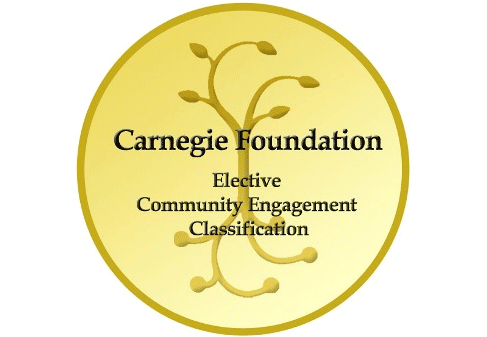
Allegheny College One of 24 PA Schools Recognized Nationally For Community Engagement
Jan. 7, 2015 – Allegheny College is among 24 Pennsylvania schools—and 361 U.S. colleges and universities—to receive the Carnegie Foundation for the Advancement of Teaching’s 2015 Community Engagement Classification. This is the second time that Allegheny has been chosen for this prestigious recognition.
According to the Carnegie Foundation, colleges and universities with an institutional focus on community engagement were invited to apply for the classification, first offered in 2006.
“This is a very significant designation of the college’s involvement in the community beyond the campus. Allegheny was part of the first class in 2006, so we were eager to reapply this past year,” says David Roncolato, Allegheny’s director of civic engagement. “Since 2006, our commitment to engagement in the community beyond the campus has deepened.”
Unlike the Carnegie Foundation’s other classifications that rely on national data, this is an “elective” classification—institutions like Allegheny participated voluntarily by submitting required materials describing the nature and extent of their engagement with the community, be it local or beyond.
Roncolato cites numerous examples of Allegheny’s commitment to local, national and global engagement efforts, including:
- Meadville Area Collaborative (MAC): A partnership with the City of Meadville, the Meadville Medical Center, Crawford Central School District and, more recently, other local organizations to seek opportunities to build and sustain a healthy community.
- Partners in Education (PiE): A collaboration with the Crawford Central School District and others that fosters intellectual enrichment and ethical development for all learners, with a focus on the most at promise.
- Alternative Spring Breaks: Weeklong, issue-focused trips that give students service experiences in other parts of the country.
- Bonner Program: The Corps of 60 Bonner Leaders and Bonner Scholars commit to making service a priority in their college experience. They work closely with local nonprofit agencies for up to four years.
- Davies Leader Program: Students are partnered with a local nonprofit agency, with the goal of creating a lasting impact by completing a project that encourages students to become involved in their local community.
- Gail Howe Fahrner Fund: Provides significant annual support for the academic and applied community engagement initiatives conducted by faculty, administrators, and students through the Office of Civic Engagement within the Allegheny Gateway.
- Service Saturdays: One Saturday morning each month, students gather to address needs of the Meadville community.
- Make a Difference Day: Usually the third Saturday in October, more than 700 Allegheny students and 700 community members complete more than 125 projects in the local community.
Locally, Allegheny students serve at more than 30 agencies and annually complete more than 61,000 hours of community service. Each year there are 15 to 20 academic courses and research projects involving community engagement. Allegheny students and faculty, working in collaboration with community partners, impact efforts in the following areas: environment, health, homelessness, hunger, wounded/abandoned animals, senior citizens and women’s issues, education and underserved youth.
“Allegheny’s commitment to service is evident among many individuals, units and offices—from the president and provost, development, academic departments, student affairs and the new Allegheny Gateway,” Roncolato says. “We are especially indebted to our community partners who are, for our students, the co-educators of civic engagement.”
For more information about the Community Engagement Classification and to see a complete list of institutions selected, visit nerche.org.